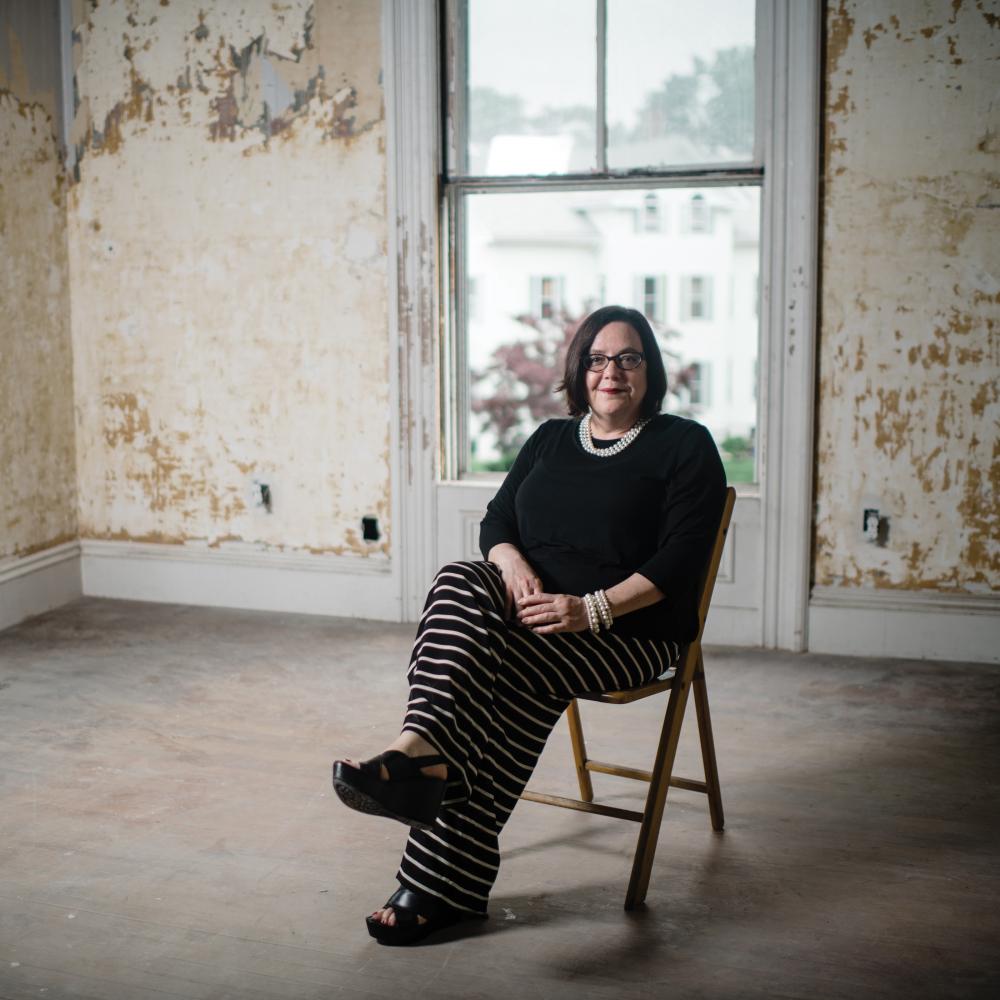Elizabeth Francis spent many years following a self-described conventional academic path—a bachelor’s degree from Hampshire College, then an MA and PhD from Brown University in American studies. “I expected to be a scholar and a professor,” she recalls.
In 2002, Francis published a book, The Secret Treachery of Words: Feminism and Modernism in America, and taught, yet was drawn to an Internet startup developing web-based history books. After the Internet bubble burst, she went back to Brown, but in a decidedly different role: director of corporate and foundation relations.
As Francis worked with faculty, she noticed something new and exciting. Faculty were working in teams in a highly collaborative way and were tremendously connected to those they served. She expressed her enthusiasm for that paradigm to a friend, Mary-Kim Arnold, who was then executive director of the Rhode Island Council for the Humanities, and it led to Francis being invited onto the council’s board in 2010. Three years later, after Arnold stepped down, Francis, who had become head of the grants committee, was chosen as executive director.
Through Rhode Island’s council, Francis says she has seen and felt the intense impact of local projects crucial to small organizations with limited access to resources. She cites how a relatively small grant gave a group at Hearthside House Museum in Lincoln the ability to mat and frame a precious cache of twentieth-century photographs and work with a curator from the Rhode Island School of Design to create an exhibition.
“Sometimes the grants are small and the projects are small, but they are all very meaningful,” Francis says. Since its inception in 1973, as part of its mission to “seed, support, and strengthen,” the Rhode Island council has provided more than $8 million in grants to support more than 650 organizations in the state as well as independent researchers and filmmakers.
Such success has prompted Francis’s central initiative—to look for ways to do more by building local partnerships and helping to expand humanities resources.
“What I seek to do is help the council grow by diversifying its resources,” Francis says. Funding from the National Endowment for the Humanities is foundational to the council, she says, but to expand its impact the council needs to build further support among corporations, government, foundations, and individuals. “Big ideas are connected to large resources.”
One of the Rhode Island council’s larger-scale projects has been Catalyzing Newport, which brought many local organizations together and also engaged visiting scholars. The council facilitated collaborations that generated and advanced ideas to create a more resilient, sustainable, and innovative city. For instance, participants worked with a futurist to examine the impact of climate change on the coastal city, creating a pop-up installation titled “Mayor’s Office, 2061” that showed how rising sea levels would alter the city’s cultural and historical sites.
Another broader initiative is Rhode Tour, a statewide digital platform for Rhode Island stories and history. A joint venture with the Rhode Island Historical Society and the John Nicholas Brown Center for Public Humanities and Cultural Heritage, it involves a smartphone app and website. Four years in, it has led to the development of more than 22 tours around the state and more than two hundred Rhode Island stories, using text, sound, and images. The council and partners have played “an enabling role,” Francis says, by developing the idea and its infrastructure. “We provide all the scaffolding,” she says, while giving historical and cultural organizations as well as scholars and independent researchers the freedom to identify sites and define and script tours.
Currently the council is working with Rhode Island Public Radio on “Journalism, Democracy, and Community,” which brings to Rhode Island for the first time a new technology platform designed to connect reporters with local citizens and communities on topics citizens choose. It also includes a podcast series and other ways to connect reporters with local citizens and communities.
Rhode Island is the smallest of the 50 states by area, and it has among the fewest residents, but it is one of the most densely populated. Because of its compactness, Francis has found great value in “the idea of Rhode Island as a laboratory, where you can test things, develop models.” Because of geography, “you can get everyone in the same room pretty easily in terms of cultural leaders and stakeholders,” she says, a far cry from the situation in larger states. “You can go to people and they can come to you.”
Tell me more, Elizabeth
If you could live in any time period other than your own, what would that period be? Post–World War II Los Angeles. My mother moved from Long Island, New York, to Pasadena when she was in high school. The way she talked about L.A. made it seem so glamorous—cool jazz, modern design, many cultural influences, the art scene—plus the beaches, of course. What is the oddest job you have ever held? I painted houses for the summer after my first year in graduate school. Perfect! My favorite fact about Rhode Island is . . . The Rhode Island School of Design was founded in 1877 by the RI Centennial Women’s group with funds raised to promote women’s inventions and patents at the 1876 Centennial Exposition. Living in Rhode Island, you have to make choices. Boston Red Sox or New York Yankees? Pawsox! The minor league affiliate of the Boston Red Sox.


